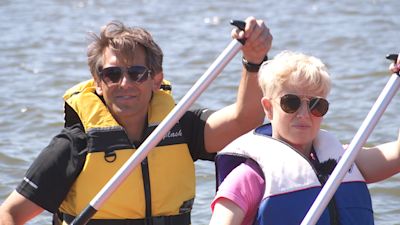ITV News Anglia presenters Becky Jago and David Whiteley are on the trail of our plastic pollution

Becky Jago and David Whiteley follow the trail of our plastic waste
ITV News Anglia's presenters Becky Jago and David Whiteley have taken to the water to discover how litter pollution is plaguing our rivers.
Every year an estimated 11 million tonnes of plastic enters the ocean, according to the Marine Conservation Society.
Most of that pollution originates on land and makes it way into the sea through our rivers, so Becky and David have decided to follow the route of the plastic.
Starting in Oulton Broad in Suffolk the ITV presenters paddled on the freshwater side of Mutford Lock along Lake Lothing which eventually reaches the North Sea.
Travelling with them was microplastics scientist Thomas Maes, otherwise known as Dr Trash, because of his work to clean up our rivers.
Stopping at a remote beach in Lake Lothing, the trio found plenty of litter - the majority plastic but also wood, glass and metal. In just 15 minutes they had filled three bin bags with rubbish.
They found industrial waste and consumer products like food and cigarette packaging.
Marine litter expert Thomas Maes, said: "As part of my research I look at waste in the environment, the majority of which is plastic.
"Unfortunately if you don't dispose of it correctly or manage it correctly, it ends up in the countryside, rivers and eventually goes into the ocean.
"Rivers are a pathway. They cleanse the land with rain and it comes into the river and then it flows into the ocean eventually."
Speaking about how to solve the plastic problem, Mr Maes said consumers should try to use less.
He added: "The less we use the less we have to deal with in the end.
"Producers should think better about all the different varieties they put on the market - the different additives and colours and shapes and sizes makes recycling really difficult."
Want a quick and expert briefing on the biggest news stories? Listen to our latest podcasts to find out What You Need To Know